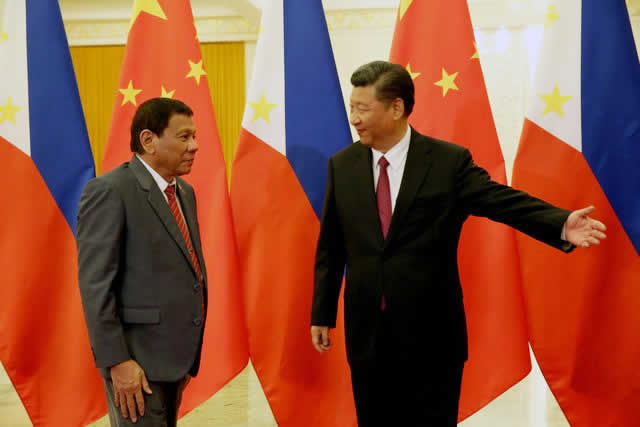|

Philippine President Rodrigo Duterte and
Chinese President Xi Jinping.
Malacańang file photo
 uring
Chinese President Xi Jinping’s recent visit to the Philippines, a total of
29 agreements were signed between him and Philippine President Rodrigo Duterte.
Everything from “trade and investment, banking and finance,
infrastructure, agriculture, education, culture and people-to-people
exchanges,” all the way to a “memorandum of understanding (MOU) on
cooperation on oil and gas development in the West Philippine Sea” as
reported by the Philippine News Agency (PNA). The MOU in question has
created significant ripples in the Philippine Senate where Duterte’s
detractors say such an agreement might actually violate the country’s
Constitution. uring
Chinese President Xi Jinping’s recent visit to the Philippines, a total of
29 agreements were signed between him and Philippine President Rodrigo Duterte.
Everything from “trade and investment, banking and finance,
infrastructure, agriculture, education, culture and people-to-people
exchanges,” all the way to a “memorandum of understanding (MOU) on
cooperation on oil and gas development in the West Philippine Sea” as
reported by the Philippine News Agency (PNA). The MOU in question has
created significant ripples in the Philippine Senate where Duterte’s
detractors say such an agreement might actually violate the country’s
Constitution.
But for all Xi’s past
promises of China’s financial largesse to Duterte, hardly any has come
to fruition. Take Duterte’s Mindanao Rail Project. The USD$4 billion
project plans to encircle the island of Mindanao with railroad tracks.
As Bong Sarmiento in the Asian Times reported, Duterte himself, in his
2016 State of the Nation Address (SONA), “proudly predicted that the
Mindanao railway system would be up and running before he steps down
from power in mid-2022.”
In another more recent
article, Sarmiento notes that “it remains unclear why Beijing has
tarried in making actual outlays while other One Belt, One Road
initiatives are steaming ahead in other Asian countries. Some analysts
suggest Beijing may be withholding the funds until the bilateral
relationship is more firmly consolidated, including in regard to
unresolved territorial disputes in the South China Sea.”
Despite the tough-guy
image he projects to his countrymen—and everyone else, Duterte appears
beholden to China and Xi in particular. In their eyes he likely appears
as the meek supplicant leader of a vassal state within their sphere of
dominance.
As we have pointed out in
a previous editorial, it might actually be a blessing in disguise that
the Philippines has received few loans from China, given the
back-breaking Chinese debt incurred by countries like Djibouti, Sri
Lanka, Pakistan, Malaysia, and Cambodia—to name a few.
The Philippines would do
best to deal with China at arm’s length, especially now that China,
under Xi is showing the world its more aggressive, autocratic side.
Also, the Philippines has been fighting communism since 1946. First,
against Hukbalahaps, then the North Koreans, then the North Vietnamese,
and to this day, the New People’s Army (NPA). For Duterte to think that
Filipinos will now readily embrace the Communist Chinese is wishful
thinking, given the fact that we have been fighting communism for more
than half a century.
Futhermore, let us not
forget that the People’s Republic of China has refused to turn over
reefs, islands, and shoals that a lawfully constituted international
court had unanimously adjudicated as belonging to the Philippines. China
flexes its military muscle revealing its hegemonic aspirations with each
passing day. Filipinos can see this and they will not be easily swayed.
Published
11/25/2018 |